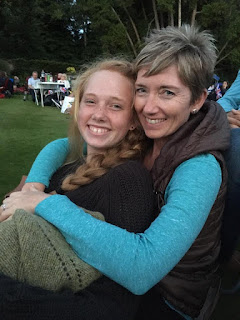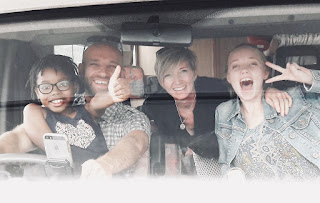There’s a faint, pretty much constant buzz in my mind these days, that mostly stays in the background and every so often moves front and centre. Next summer my eldest baby will leave home. It might not be forever - let’s face it, moving back in with Mum and Dad is always an option. My sister-in-law moved back in with her parents in her 40s, for a wee while, and many of us may end up moving in with ageing parents in another season. So yes, this is just the first of many physical shifts in our parent-child living arrangements. And it still feels like a Really Big Deal.
One of the things I find myself thinking about in relation to the Really Big Deal is whether we have adequately prepared her for life as a young adult in the world. You’re welcome to smirk (kindly) at this point, and tell me that it’s a little late to be worrying about that. And you’d be right. Other than learning to drive (that's on our list) there’s not much a parent can hope to teach a child in the final months of sharing the same roof that they haven’t already.
A couple of years ago I came across a list of 20 or so things (only 20?) that a parent should be sure to teach their kid before launching them into adulthood. I admit, everything in me wanted to take that list and deconstruct it, creating monthly and weekly goals so that we could be sure of covering all the bases. I felt this welling internal pressure - Oh God, did we remember to teach her how to figure out her taxes?! - as if parenthood is a now-or-never sort of a deal.
My ever sane and sensible husband talked me back from the brink and we never did turn our parenting into a checklist. Now I find myself pondering: what have we taught her then? And how, exactly, did we manage to do that?! Was it all the repeated directions when she was a preschooler, reminding her on a daily basis to brush her teeth, or pick up her toys, or apologise when she did something wrong? It seems like there must be more to it than that - she’s a pretty fabulous human being, I’m not just saying that because I’m her mum - so how did she learn all that stuff?
It feels to me that there are three ways she’s picked up what she knows so far:
There’s definitely a place for good instruction. This is the WHAT of learning to be a decent human being. How do you know what you don’t know unless someone tells you?! Both my kids make their bed every day, basically because I kept telling them to do it until they did. (Watch this to know why I personally think making your bed is a good skill to learn 😉) Between birth and the grand old age of almost-18 our daughter has learned a million things. From tying her shoelaces to loading the dishwasher, from changing a light bulb to checking which switch just tripped on the electricity panel. These are things she knows how to do because someone taught her.
2. We showed her how to do it
There’s more than one way to make a bed. Feather duvets can be fluffed up over a whole mess of stuff you don’t want to deal with at 7am. Like dirty socks, the plate that held last night’s toasted sandwich, or the book you fell asleep reading. Some days things just have to be done over, you know?
So yes, there’s room for learning HOW to do a thing through supportive coaching. Even just this past week, I’ve been amazed by the things our daughter knows how to do. She spent a few hours in Tim’s workshop and emerged with perfectly crafted loom on which she proceeded to weave a wall-hanging. No one showed her how to do that, exactly (aside from Mr Google) but the Saturday afternoons creating things with her dad laid the groundwork.
3. We showed her why we do it.
This one is the invisible, hugely underestimated part of parenting. This is why you’d be forgiven for smirking at the idea that we can, in the next 7 months, make any significant changes to what we’ve taught her so far. This stuff isn’t about what we taught her, but what she caught from watching our lives. This is the place of greatest joy and the most heart-stopping reality checks. Our kids are watching us, like, all the time. Our values are contagious and become the WHY of how they live their lives.
Two examples:
I’ll start with the good one. An overnight guest was due to arrive at the house at a time when neither Tim nor I could be there. When we arrived home, both the girls had introduced themselves to their new friend who was now being engaged in an interesting conversation, enjoying a beautifully presented drink and snack. Kez hadn't just made her own bed and checked the house was tidy, she'd made up the guest room too. The thing that touched me wasn’t just that the girls knew how to 'do the right thing', it was that they exemplified the value of hospitality, of honouring a person by creating a welcoming space. We didn’t give them a lecture about that, they just picked it up.
The other story makes me sad. We were visiting Barcelona, a city we’re unfamiliar with. A homeless guy approached our daughter and asked for money. In a flash, I saw a look of compassion but confusion on her face. It wasn’t just that she didn’t know what to do, it was that she wasn’t sure whether she should. It means she hasn’t seen us behave consistently generously towards people we don’t know who are asking for help. I have communicated to her my own guarded uncertainty and confusion, rather than a clear reason why we should always treat people as precious. It was a wake-up call.
And if all else fails, at least she knows how to make her bed.














